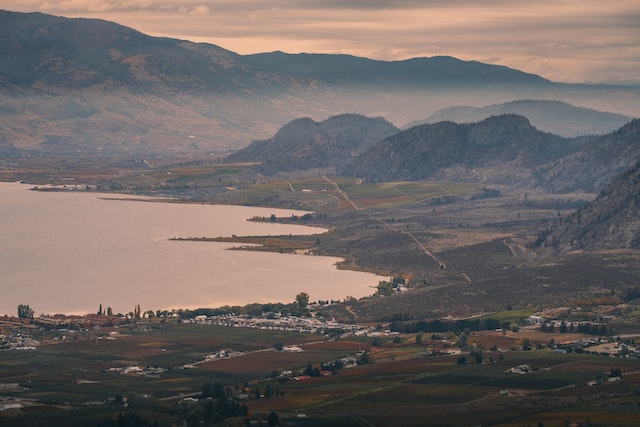Kelowna, B.C. – The much-anticipated Nk’mip (Osoyoos Lake) water science forum is making a return to the Okanagan valley, Oct. 27-29. Following on earlier forums in 2007, 2011 and 2015, the event is a cross-border gathering, connecting residents and researchers, policy-makers and water managers with a shared interest in the health of the lake.
The gathering in Osoyoos is being presented by Osoyoos Indian Band, Okanagan Nation Alliance (ONA), the International Joint Commission, Okanagan Basin Water Board (OBWB) and the Town of Osoyoos. The theme of this year’s gathering is “Nk’Mip (Osoyoos Lake) – The Heart of the Watershed: Bridging Indigenous and Western approaches to Knowledge, Science and Management.”
As noted in the Syilx (Okanagan Nation) Siwɬkʷ (water) Declaration: “siwɬkʷ is a part of us and a part of all life. siwɬkʷ must be treated with reverence and respect.” This understanding grounds the three-day focus on our relationship with Osoyoos Lake.
In preparation for deeper discussions, the conference begins with a welcoming reception at Nk’Mip Desert Cultural Centre and guided field tours of the desert centre and kłlilx’w (Spotted Lake) – a sacred site to the Syilx Nation and protected heritage site. There will also be a special launch of the WaterWays exhibit – a UBC Okanagan, Syilx community and OBWB-Okanagan WaterWise joint project – at Osoyoos & District Museum and Archives. Posters highlighting current local water research, and presentations and discussion at the Sonora Centre on current water issues will round-out the event.
According to OBWB Executive Dir. and Conference Chair Anna Warwick Sears, topics include how lake water levels are managed, what Indigenous knowledge tells us about lake health, fisheries restoration, and the impacts of climate change.
“People who live along Osoyoos Lake, care about Osoyoos Lake and want to know how they can contribute to make it better,” she said. “This is the best opportunity for folks to speak directly to the people who manage the lake.”
Kelly Terbasket is Program Director of IndigenEYEZ and is co-facilitating the forum with fellow Syilx Okanagan nation member Aaron Derrickson, who is currently finishing his Ph.D. in Syilx leadership and governance. “I’m looking forward to weaving our syilx knowledge systems – our ways of learning, into the discussion,” she added.
For Terbasket, she has concerns about the issues facing water in the valley. “Our people have been here since time immemorial and have knowledge systems, principles and practices that have helped ensure a sustainable water supply. Yet, we have not been included in discussions that affect the water – like mines, forestry, agriculture, dams.” As the region faces floods, drought and fire, the concern grows for Terbasket.
“So how do we remove the division between the people with the authority, making decisions, and the people – syilx and settler – who care and want to do something? It starts with building relationships and trust,” said Terbasket, adding this gathering gives her great hope. “This is a very important step.
“You can build a great strategy, but you won’t go anywhere without relationship.”
Sears is also looking forward to a rich conversation and the relationship-building. Much has been accomplished since the first forum, she added. In 2007, it was about opening a dialogue before operating orders on Zosel Dam – which controls Osoyoos Lake levels – were updated. In 2011, there was discussion about studies looking at balancing the water needs of fish, farmers on the Canadian and U.S. side of the lake, and more. Since then, there has been a tremendous amount of activity by many, including ONA and its members who released the Syilx Nation Siwɬkʷ (water) Declaration in 2014 and the Syilx Okanagan Siwɬkʷ Strategy in 2021, plus significant progress on fisheries. “There’s a lot to share,” she noted.
Speakers include: Syilx nation member Tessa Terbasket on the development of an Okanagan Lake Responsibility Plan, currently underway, using the syilx methodology; Environmental Consultant Gwen Bridge on what is Indigenous knowledge and what is western science and how they complement each other; IJC Commissioners Merrell-Ann Phare (representing Canada) and Lance Yohe (U.S.) on the International Watershed Initiative; And, Robert Sandford with United Nations University’s Institute for Water, Environment and Health will provide a summary with important insights from the conference.
Although the forum is focussed on Osoyoos Lake, it relates to the entire Okanagan-Okanagan Lake
Okanogan watershed (from Armstrong to the Columbia River) since the waters are all connected. And, all are invited, said Sears. “I’m looking forward to seeing people in person,” she added. “No matter how many Zoom meetings we’ve attended in the last few years, you can’t replace the quality of dialogue that comes with in-person gatherings.”
Special rates are available thanks to sponsor support. For residents of Oliver, Osoyoos and Oroville, registration is $20-35. Registration includes welcoming reception, breakfasts, lunches and snacks. First Nations members and students are free. For more information and to register, visit: https://www.obwb.ca/olwsf/.









